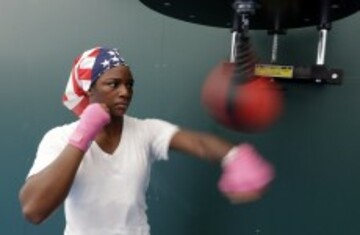1. “When you love something, you have the capacity to bore everyone about why—it doesn’t matter why. Wrestling, like boxing, is a weight-class sport; you get to bump into people your own size. You can bump into them very hard, but the place where you land is reasonably soft. And there are civilized aspects to the sport’s combativeness: I’ve always admired the rule that holds you responsible, if you lift your opponent off the mat, for your opponent’s “safe return.” But the best answer to why I love wrestling is that it was the first thing I was any good at.”
Jon Michaud of the New Yorker takes an illuminating look at novelist John Irving’s longstanding fascination with wrestling.
2. “The power of religious belief in sport can reduce anxiety, enhance identity and self-confidence, helping athletes navigate the stressful environment they inhabit.
“Whilst religious belief may be in decline amongst the general UK population, in sport it seems quite the contrary. Consider the number of sportsmen you see crossing themselves as they run out on to the pitch, or those who point skywards after scoring a goal, attributing credit to God.”
Writing for BBC Sport, Ben Oakley from the Open University provides a fascinating insight into the relationship between athletes and religion.
3. “Asia’s base is much narrower and, while the total is increasing, there are far fewer Asian players playing in the world’s top leagues than Africans. But Japan and South Korea both have established domestic leagues and a coaching infrastructure; there is a clear route for development that doesn’t involve the discomforting practice of agents hawking teenagers around mid-ranking clubs on a different continent.”
While both South Korea and Japan may have crashed out at the semi-final stage of the Olympics in football, Jonathan Wilson asks if the continent is about to surpass Africa in terms of footballing excellence.
4. “On Saturday, I heard a commentator introducing a heat of an athletics event say something to the effect of “there’s nobody British in this, so no need to pay much attention”, and that, I’m afraid, is the tone of the Beeb’s coverage. From the pathetic and embarrassing Big Ben gold medal counter – please, Gabby, get rid! – to the ludicrously uncritical interviews with Lord Coe – ask him why it’s almost impossible to buy tickets on the Locog website! – the BBC appears to have forgotten its remit to be balanced and impartial. Instead, they’ve become fans with microphones.”
Whether or not you agree with Simon Kelner‘s controversial article criticising the BBC’s coverage of the Olympic Games, it’s certainly an interesting and provocative read that asks some legitimate questions of the broadcaster.
5. “The girl’s name is Claressa Shields. She started training with Crutchfield when she was eleven, and though she is only a junior in high school, she has all the prerequisites of athletic stardom. Everyone realized it at the U.S. Olympic Team Trials this February, when the twenty-four best female amateurs in the country competed for three spots in the upcoming London Olympics—the first in history that will allow women to box for a medal. Shields weighs in at a hundred and fifty-eight pounds; she fights as a middleweight, one of the three weight classes in the women’s division. (The men’s division has ten.) The bouts were held in a windowless auditorium of the Northern Quest Resort & Casino, outside Spokane, Washington, a sprawling complex full of slot machines and cigarette smoke, with fourteen restaurants and a view of the local prison.”
Katie Taylor isn’t the only person shaking up the world of women’s boxing, as this article by Ariel Levy of the New Yorker attests.
6. “American target shooter Josh Lakatos faced a conundrum. Halfway through the 2000 Summer Olympics in Sydney, he and his rifle-toting teammates were finished with their events, and the U.S. Olympic Committee and team officials had ordered them to turn in the keys to their three-story house and head back to the States. But Lakatos didn’t want to leave. He knew from his experience four years earlier in Atlanta, where he’d won silver, that the Olympic Village was just about to erupt into a raucous party, and there was no way he was going to miss it. So he asked the maid at the emptied-out dwelling if she’d kindly look the other way as he jimmied the lock. “I don’t care what you do,” she replied.”
This piece on Sex and the (Olympic) Village by ESPN‘s Sam Alipour is an amusing read if anything else.









Two greatest sporting occasions ive ever witnesses were that game and also mayo v Dublin in all Ireland semi final. I can say that with objectivity coz I’m from Kildare but I have to say that afternoon when mcateer stuck it in the Dutch met will live with me till the day I die. COYBIG!
No he did not get booked for that challenge, just a talking to.
Coybig
He also had a great bit of skill in the lead up to the goal if memory serves
was he booked for that? I can’t recall
@Cathal, I agree 100%. I was at both games and McAteer’s goal was a classic
The Mayo comeback was incredible …..and I’m a Dub!.
One bad memory I have of the Dutch game was when Hassellbank came on as a sub the monkey chants started and some idiot even threw a banana onto the field. I was disgusted and the dope that threw that fruit onto the field was lucky I wasn’t standing near him. Yes, I am a Chelsea supporter also.
What a tackle , will never forget that day in the south terrace, but people forget Overmars was man of the match that day
Not the official man of the match ,but Overmars tore Ireland’s defence apart that day
The Dutch would have won if the ball ran evenly across the surface. Rugby pitch suited Ireland. Always remember Kluivert’s early miss.